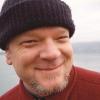I long to find pristine wilderness and be thrilled by its sheer existence. I want the wonder of the wild to flow back into my domestic life and animate me as I sit in front of a computer on a street made for cars.
But I’m afraid that the wild places are gone. Not only have we explored every corner, we’ve also left our waste behind. I wish I could swim in the sea, chew on a blade of grass, or pluck a tomato from our garden (where trucks “fog” with poison to kill mosquitoes) without worrying about foreign substances that will make me sick.
Every once in a while I get a fresh shock that we have indeed finally ruined every aspect of the planet. Each of us, I bet, experiences this “eco shock.” It could be the scale of an oil spill, the lack of ice for polar bears, or the amount of trash in the Antarctic. I got such a shock recently when I read that babies born to mothers in the United States are tainted by an average of 200 industrial chemicals.
In the book, Technonatures (Wilfrid Laurier Press, 2009), Julie Sze writes that babies absorb pollutants through the umbilical chord. These include “pesticides; consumer-product ingredients [including Teflon]; stain and oil repellents from fast food packaging, clothes and textiles; and wastes from coal, gasoline and garbage.”
Not babies! Please don’t tell me that babies are born polluted. (Maybe the Mennonite in me wants to keep the children pure.) When will the absurdity cease to be normal? When can we fret together and chart a new path?
Eco shock can bring despair. I am familiar with despair, for it is a companion on my quest for liberation from destructive human behaviour. I’ve learned to equate this despair with compassion.
Suffering caused by humans makes me sad. I’m sad because I will not resign myself to affliction and destruction. I eagerly want a better world for those who languish, whether they are the victims of land mines, the “garbage” fish caught in commercial nets, or the animals and plants torn asunder for roads and malls.
This can’t be the end of the story. I believe that Life Itself will not be obliterated. This is what qualifies me as a believer. I use the phrase “Life Itself” with capital letters, to designate what some Christians might call “God.” I see, hear and feel Life Itself all around us. Not only is it not destroyable by humans, it is also wild.
God is here in our midst. God is in the roots that push up the asphalt and bring the crews to patch our walkways. God is in the streams that cause large sink holes that swallow homes whole. God is in the dandelion, the smell of the skunk, the rebellion of the poet and the defiance of a child.
Yes, there is wildness in this world. It is no longer a frontier for commercial explorers to conquer. It is no longer for Christians crusaders to subdue with their rhetoric of stewardship or their “masculinist” tendency to dominate and control. The wildness is both the looming revenge of nature and fuel for the prophet’s imagination.
The apocalypse may be real, but unfamiliar to those of us bent on destruction. It may be that wildness once again will reign. Locusts and honey, feral and tame. I think there are still wild places on earth.
Aiden Enns is a member of Hope Mennonite Church, Winnipeg, Man., and the editor of Geez magazine. He can be reached at aiden@geezmagazine.org.


Add new comment
Canadian Mennonite invites comments and encourages constructive discussion about our content. Actual full names (first and last) are required. Comments are moderated and may be edited. They will not appear online until approved and will be posted during business hours. Some comments may be reproduced in print.